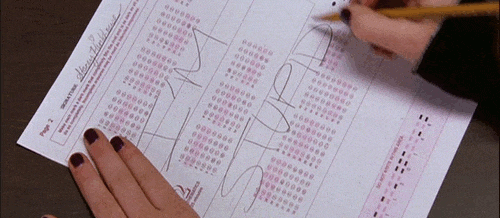Tests are the central focus of the American education system. From midterms, to finals, even to the GRE, our future is and always has been decided by our test scores. Even the most liberal, freewheeling, go with the wind type classes will have some form of examination given, if for no other reason then to see "who's learning and who isn't." While teachers and professors have seemed to grasp the fact that not everyone learns the same way, they have yet to come to the realization that not everyone tests in the same way either. So, what happens when you know the material, but just don't test very well?
The answer is obvious: everyone assumes that you're dumb.
It's a very common leap people make; someone not taking to examination well means they're not very intelligent, but at the same time, there can be any number of reasons for someone, who otherwise comes across as a smart person, would fail any test, no matter the subject. The effects of this leap and failure to realize the cause can lead to frustration and misunderstanding, and a large deal of stress on the test taker in question.
1. People think you're an idiot.
This is the most common result of being a bad test taker. While social stigma and ill looks from your professors can be disheartening, this isn't even the worst part. Admissions to colleges, both undergrad and grad school, are largely dependent on the results of your SAT, ACT, or GRE scores. College boards falsely correlate a good test score with above average intelligence, and bad scores with low intelligence. In high school, I had a 4.5 GPA and was in all AP classes, but since my SAT scores were, to say the least, abysmal, the college admissions process was a giant hassle because people just assumed that since I did so bad on the test, I'd mess up in undergrad too.
2. People assume you're lazy.
"You should have studied more!" How many of us who are just horrible at test taking have heard this line before? And those of us who don't test well can also attest to the fact that we probably study more than the average person, because we know that we're already at a disadvantage by stressing at the sight of fill in the blank or multiple choice. No matter how hard we study, we're going to underperform compared to our classmates, even if we knew the information backwards and forwards. Since we did so bad, we're ashamed to say how long we spent studying. But we're told to put more time in and work harder, as if we weren't doing that to begin with.
3. Learning disabilities aren't taken into account.
We've all known (or are) the people with ADD, dyslexia, or any number of learning disabilities that make test taking more difficult. And sure, documents may give us some extra time or accommodations, but the scorer or the exams (or readers, in case of the higher testing) don't take this into account. Even our peers can say we're just "making excuses" and could do better on the tests if we tried. I have dyslexia and dysgraphia, which impairs my ability to read and write things correctly, particularly in times of stress. I could know everything about a subject matter, but there are times when I'll mess up and not realize it until after I get my score back.
4. People's perceptions of intelligence are warped.
Just as it is assumed that those who are bad at taking tests are stupid, people who are excellent test takers are often assumed to be geniuses. Let it not be twisted; I'm sure the majority of people who are good test takers are also intelligent. The main point here is that a test cannot really measure the absolute intelligence of a person. There are so many factors to take into account, such as learning ability, subject matter, etc. Besides that, like I said, not everyone test takes the same way. Some people are better at essays, some people prefer multiple choice. Some people could speak about a subject for hours on end in infinite detail, but the second you put a quiz in front of them, they forget how to spell their own names.
The smartest person in the room could bomb the SAT, the not as smart person could just be really good at taking tests. It's hard to say and not so easy to judge.
5. R.I.P to my GPA.
At the end of the day, the majority of my course load over the last few years at college have resulted in some form of testing. The same likely goes for most college students, especially those who attend larger institutions. A large portion of our grade is often two or three tests, and as always, the professors decisions are final. Sure, we can work as hard as we want, do all of our homework, ace the heck out of the projects and participate as often as possible. However, that bad test score will drag our average down every time, and we all know it.



























